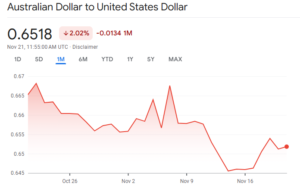Why Does the AUD Keep Going Down? And Which Stocks Benefit From That?

The Australian Dollar (AUD) has been on a downward trajectory. This decline reflects global economic dynamics, including interest rate drops, trade dependencies, and geopolitical uncertainties. Understanding the reasons behind the weakening AUD and identifying the sectors and stocks that benefit from such conditions is essential for investors.
Why Does the AUD Keep Falling?
Changes in Interest Rate
A significant driver of the AUD’s weakness is the disparity that exists between the US Federal Reserve’s and the Reserve Bank of Australia’s (RBA) monetary policies. While the Fed has aggressively raised interest rates beyond the gradual 5%, the RBA has maintained a more moderate rate of 4.10%. This has caused a significant differential in interest rates and investors are drawn to the appeal of the USD stock market. Higher US interest rates make USD-denominated assets more attractive, drawing capital away from AUD investments.
China’s Economic Slowdown
China is a close trading partner of Australia. Thus, Australia’s economic health is linked to that o China’s growth. With China’s property market experiencing a sharp downturn and the overall economic growth of the country slowing, demand for Australian commodities has declined. With countries like the U.S. imposing sharp tariffs on products from China, the country further experienced a sharp decline in trading commodities. Moreover, the AUD often serves as a stable proxy for global sentiment toward China’s economy. This significantly displays the country’s volatility during certain periods of instability that prevailed in the Chinese market.
Commodity Price Fluctuations
Australia is a major exporter of commodities like iron ore, coal, and natural gas. Since the country is naturally strong with resources, its economy is highly dependent on trading commodities. Falling commodity prices, influenced by global supply-demand dynamics along with reduced Chinese demand, directly impact the AUD’s strength. This causes a considerable rift in the import and export activities of Australia thus creating a solid gap in its economic conditions.
Impacts of a Weak AUD
A declining AUD value is a mixed bag for the Australian economy. Products and services priced in AUD become cheaper for international buyers, often resulting in increased demand. Certain companies benefit from the weak value of AUD because their earnings in stronger foreign currencies (like USD) are converted back into AUD, strengthening their revenue streams.

The tourism and education sectors thrive when the AUD weakens, as Australia becomes a more affordable destination for international tourists and students. The favourable exchange rate allows international visitors and students to get more value for their money, directly boosting revenue in these industries.
While export-oriented businesses benefit, companies heavily reliant on imports face rising costs. Electronics and machinery sourced from other countries become more expensive, potentially squeezing profit margins.
Items such as fuel, consumer electronics, and medicines become pricier, thereby eating the income of households. This inflationary impact can induce the Reserve Bank of Australia to adjust interest rates to control price stability. This will affect the borrowing and investment decisions of people.
Australia becomes an attractive option for foreign investors during periods of low value of AUD. With favourable exchange rates, people show encouragement to invest in property, equities, and businesses. For example, foreign buyers might consider undervalued Australian real estate and acquire stakes in ASX-listed companies.
Firms with operations and revenue streams established in multiple countries often find themselves in a favourable position when the AUD weakens. Their bulk gains overseas can offset any domestic challenges posed by a weak currency.
ASX Stocks That Benefit From a Weak AUD
On the ASX, several companies stand out as beneficiaries of the weak value of AUD due to their operations, sales at a global scale, or export activities. These companies not only thrive under such conditions but also provide an opportunity for investors to capitalise on the weak value of AUD.
BHP Group (ASX: BHP)
BHP, one of the largest mining companies in the world, is a prime beneficiary of a weaker AUD. The company earns the majority of its revenue from exports of commodities like iron ore, copper, and coal, priced in stronger foreign currencies like the USD. In FY2023, BHP reported over $65 billion in revenue, with more than 80% of its sales originating from international markets. A declining AUD strengthens BHP’s earnings when these foreign revenues are converted back to the local currency.
Rio Tinto (ASX: RIO)
Like BHP, Rio Tinto also benefits substantially from exporting commodities priced in USD. A weaker AUD reduces the company’s operating costs in Australia relative to its revenue in USD. This enhanced its profit margins. Its iron ore and aluminium operations cater to a wide range of global markets, particularly China and the United States. This virtue of the company makes it well-positioned to gain from AUD’s weakness.
CSL Limited (ASX: CSL)
This biopharmaceutical giant is another standout beneficiary of a weak AUD. The company generates most of its revenue from international markets, particularly the United States and Europe. Its products, including vaccines and plasma-based therapies, are priced in USD and Euros. In FY2024, CSL generated approximately 90% of its revenue outside Australia. Because of this shift, CSL stands to gain from the weak AUD and strong interest rates in the U.S. and Europe.
Woodside Energy Group (ASX: WDS)
The company’s export-driven operations in natural energy made it a leading energy company in Australia. Woodside’s contracts are often denominated in USD, which means the company enjoys higher AUD revenue when the local currency weakens. The company’s revenue is closely tied to global energy demand and currency trends. Thus the company strategically diversified its customer base across Asia and Europe. This will help the company show a reliable performance in times of AUD weakness.
Flight Centre Travel Group (ASX: FLT)
A weaker AUD attracts a huge group of students and visitors. Students will opt for Universities present in Australia for education. Visitors will enjoy a wide range of benefits from choosing Australia as their holiday destination. With a weaker AUD, the country is appealing to a diverse set of people. Airlines like Flight Centre Travel capitalise on this opportunity and stand to gain from the increasing revenue from their operations.
Treasury Wine Estates (ASX: TWE)
Australia’s wine industry, hugely represented by Treasury Wine Estates, thrives when the AUD weakens. With a significant portion of its sales coming from international markets like China, the United States, and the UK, Treasury Wine benefits from the cost advantage a weaker AUD provides. A declining AUD makes Australian wines more affordable in foreign markets, thereby boosting export volumes.
QBE Insurance Group (ASX: QBE)
As a major global insurance player, QBE Insurance derives significant revenue from foreign markets. The company sees its underlying profits from various currencies such as USD and GBP. A weak value of AUD increases QBE’s earnings when foreign profits are converted back into AUD. The company also benefits from rising premiums globally. Further strengthened by favourable exchange rates, people are often attracted to the offerings of QBE Insurance Group.
Fortescue Metals Group (ASX: FMG)
Fortescue is another major mining player benefiting from the weakening of AUD. Its iron ore operations cater heavily to export markets, with China being a major customer. Like its peers, Fortescue earns in USD while incurring costs primarily in AUD. This creates a natural hedge against a weak local currency. In FY2023, Fortescue reported robust earnings, driven by strong iron ore demand and favourable exchange rate movements.
Why Do These Stocks Benefit?
The common factor that connects all these companies is their exposure to foreign markets and revenue streams in stronger currencies such as USD. A weaker AUD enhances their competitive positioning, boosts profitability, and often drives share price.
For investors, these stocks represent a strategic opportunity to align portfolios with currency trends while capitalising on Australia’s resource-rich economy and global market reach. Investing in these stocks provides a hedge against the potential AUD volatility, allowing for possible gains even during uncertain economic periods.
What Should You Watch Out For?
As investors, the relative pace of monetary shifts between the RBA and other central banks will play a pivotal role in AUD movements. It is essential to monitor the global interest rates before making any investment decision. The recovery of the Chinese market will show a significant boost in the value of AUD. The fluctuations in Australia’s export commodities must be regularly monitored because this sector holds the potential to determine the movements of AUD.
Conclusion
The weakening AUD, while posing a challenge for some sectors, creates opportunities in export-dependent industries and companies. Investors can utilise this shit and leverage this by focusing on ASX-listed stocks that benefit from favourable currency dynamics. Consider stocks, particularly in resources, agriculture, and tourism. Understanding the broader economic factors at play and aligning the investment goals with these trends is key to navigating the impacts of a falling AUD.
What are the Best ASX Stocks to invest in right now?
Check our buy/sell tips

FAQs
- Why is the AUD so closely tied to China’s economy?
China is Australia’s largest trading partner. The country accounts for a significant portion of its exports from Australia. And Australia’s economic health is linked to the performance of the Chinese market.
- Which ASX sectors lose out when the AUD falls?
Retailers and businesses dependent on imports suffer due to the rising costs of imported goods and reduced purchasing power of people.
- Is a weak AUD good for Australian investors?
It depends on the portfolio. Export-driven companies benefit, but import-heavy sectors may face profitability challenges.
- How do commodity prices affect the AUD?
As a major commodity exporter, Australia’s economic health and currency value are closely linked to global commodity price trends. Lower prices generally weaken the AUD.
Blog Categories
Get the Latest Insider Trades on ASX!
Recent Posts
ASX Lithium Stocks Surge as Prices Triple: Is It Too Late to Buy or Just the Beginning?
ASX lithium stocks rally as prices rebound ASX lithium stocks surged this week, with PLS Group (ASX: PLS) up 8%,…
Lynas (ASX:LYC) Posts 13x Profit Jump But Stock Fades. Is This a Buying Opportunity?
Lynas profits surge, but doubts remain Lynas Rare Earths (ASX: LYC) jumped as much as 5% on Thursday after reporting…
ASX 200 Reporting Season Wrap: 5 Earnings Surprises That Signal Buy Opportunities Heading Into March
ASX 200 reporting season- five stocks the market rewarded The ASX 200 touched a fresh record high of 9,202 this…


